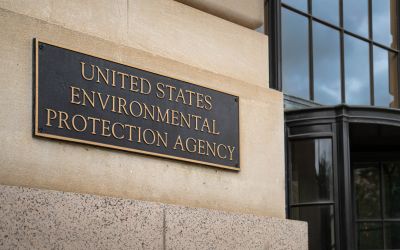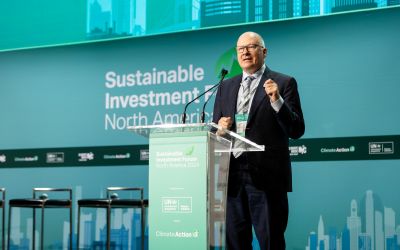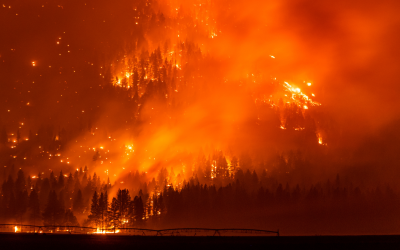John Kerry Special Intervention at CIF24 for the launch of the Climate Action Coalition
John Kerry took to the stage at the Climate Innovation Forum 2024 to deliver a Special Address and launch the Climate Action Coalition.

The signing of the Paris Agreement signified widespread recognition across national governments that human-induced climate change is an existential threat. 196 Parties adopted the legally binding treaty to pursue efforts to limit the temperature increase to 1.5°C above pre-industrial levels. However, it was not until last year’s COP28 that firm commitments to "phase out" fossil fuels were made, marking the ‘beginning of the end of the fossil fuel era’. According to the IPCC, even with current policies in place, we are heading towards a devastating 3°C by 2100.
Earlier this year, when stepping down as the US Special Presidential Envoy for Climate, John Kerry stated “my parting wish is that all of you dig deep to do everything you can this decisive decade to “keep 1.5C alive” so we protect peoples’ lives and livelihoods and ensure greater global stability and prosperity for the rest of the century and beyond.”
Last June, at the Climate Innovation Forum (the flagship of London Climate Action Week), John Kerry launched the Climate Action Coalition, which intends to do just that. This mission-driven initiative has been born with the purpose of facilitating collaborative efforts between the public and private sector to develop and scale solutions for delivering 2030 climate goals. Chaired by former Energy Minister, the Rt Hon Chris Skidmore OBE, who signed the UK’s net zero commitment into law in 2019, builds on Climate Action’s platform as one of the world's leading sustainability networks.
Please find John Kerry's full speech and transcript below. To find out more about the Climate Action Coalition and how to get involved, please see here: https://coalition.climateaction.org/
Transcript
Thank you for the invitation to join you and thank you obviously for this tremendous initiative.
Nick, I want to thank you and Climate Action, you have made an imprint. All of you who are part of it, in significant ways, in New York and elsewhere, really do have impact. People are sensitized to the choices that we face as a result of the choices you have made to be part of this.
But, first of all, I just share with you: being in public life carries its perils. I was in the airport in Boston. I was flying over here the other day and this guy is eyeing me and he comes over and says, “hey, you, hey, did they ever tell you, you look like that Kerry guy we sent down to Washington” and I say, “yeah, they tell me that all the time.” He says, “Kind of pisses you off, doesn't it?”. So, you know, you never know what to think. You never know who you're going to meet and you certainly never know what level of danger you may be in.
I've been at this a long time as Chris mentioned and I want to congratulate all of you for receiving this initiative that he is engaging in to try to augment effort.
I have been at this a long time. I was at the first COP in 1992, in Rio, and before that, in 1988, we in the US Senate listened to Jim Hanson of NASA tell us, “This is happening” - 1988. So, 28 COPs, Conferences of the Parties, later, we are still headed towards about 2.5 degrees of warming.
Now, you can look at the glass half empty, you can look at the glass half full.
When I took over this job, that President Biden created as the first envoy, we were headed towards 3.7 to 4 degrees of warming on the planet.
And with Glasgow and Sharm El Sheikh and, now, Dubai UAE - the UAE Consensus - we have actually put ourselves in a place where we've moved, there's real progress, but, still, we need to bring Speed and Scale - as the title of John Doerr's book, who is here for the Breakthrough Technology Summit, says.
We are in a fight, the fight of our lives and the fight for our lives, believe me. And I think, you know that, that's why you're here and I see heads nodding. But we can't take this seriously enough, to be honest with you, because there are a whole bunch of people who don't want to take it at all. Denialists, procrastinators, disinformationists and that has a profound impact on what's happening. We have 2000 gigawatts of renewable energy – Solar - waiting for permitting at FERC, which is our federal regulatory agency. Waiting and waiting.
We need to get those 2000 gigawatts out there.
The simple equation that we face is this, look: We don't need a new rocket algorithm or some incredible analysis by some major mathematician. We know what the problem is. It's pretty simple: We human beings continue to burn fossil fuel, without being able to capture all those emissions, filling up the atmosphere even more than we did 30 years ago.
And the consequences are that people are dying today around the world as a result of the warmth, the heat - 1000 people at the Hajj in Saudi Arabia the other day die. That doesn't mention the numbers of people that don't die in a moment of great visibility in Africa or South America or other parts of the world where the heat is nearing 50°C the other day, and in India. Now I'm not going to go through the whole litany of what we see; Mother Nature is being pretty adamant about telling us what's going on.
But the fact is, it was 70°F above normal in the Arctic last year and the Arctic is warming four times faster than the rest of the planet. It was 100°F above normal in the Antarctic. And I flew over the ice sheet there and saw these defined ripples in the West Antarctic ice sheet, which has the possibility of it breaking off and melting away and sea level rise goes above what it is. And, by the way, sea level rise is already higher than the scientists predicted.
We see floods, fires, intensity of storms all over the world. So, we know what's happening folks and we are not choosing to do simple things that we could be doing in order to address this crisis.
Now, that's sort of the half empty, the half full is actually exciting and it's what you should organize around in the context of the Climate Action Coalition and of these sub-national efforts that you're making.
The fact is that we are making progress in a whole bunch of fields. In 2004, it took a year to deploy one gigawatt of solar power. A few years later, in 2010, it took one month. In 2016, it took one week. Last year, it took one day. Now, it takes one half a day to deploy an equivalent of a large nuclear plant of solar, one half a day. And China and other countries are raging ahead in the production of renewable energy. China, in fact, is producing more renewable energy and deploying it than all of the rest of the world put together.
Now, the thought I want to leave you with, with respect to where we are, that is also glass half full.
The fact is that in Dubai at the COP, I'm sure many of you were there, we succeeded in doing a number of things. In fact, even before we got to COP, we in the US held four days of negotiations with China, a place called Sunnylands in California. And we arrived at an agreement, the first in the last four years that we were able to really break through. China agreed they will include all greenhouse gasses in their next NDC, which is due at the turn of the year. That's big! Methane now included. And they have a national plan for going after that methane. And we have actually agreed to work with them in order to achieve progress.
Methane, as you all know, is 80 times more destructive than CO2 and, even over the course of a century, it's still 20 times more destructive. And now, with permafrost thawing around the planet, you have methane rising up, fugitive gas which just pollutes. By the way, it's all pollution.
I don't know what happened to the old idea that “polluters pay”, but this is pollution and we need to be more militant and more demanding when 7 million people are dying every single year because of the bad air quality around the world. And that's not to mention the other people dying in other places.
So, I just say to you, we have an opportunity here. At every COP that we've been to over the last 30 years, there's been a fight over fossil fuel, obviously. Some people have suggested, you know, there's got to be a clear cut off moment, others push back a little, maybe we gas for a while, whatever. Here's where we are: The fact is that we are looking at a situation, as a result of COP, where for the first time ever almost 200 nations joined together to agree on something, in a process which allows just one nation to walk away and say no.
So, they all came together and said the following: It's written, it's in paragraph 28, if you want to go read it - and when you're at it, read paragraph 35, which refers to what's happening in the oceans, which is a critical component of resolving the climate crisis. Ninety per cent of the heat of the planet goes into the ocean and we're changing the chemistry of the ocean more than we have in millions of years. Not to mention the acidity, which comes because of the coal particulates that fall into the ocean with high acidity rain. So, we're looking at a situation, as a result of this last COP, where for the first time, everybody agreed, we must transition away from fossil fuel in a just, orderly and equitable manner. So as to be able to achieve net zero 2050, we must accelerate in this decade according to the science - and according to the science is not a throwaway phrase, it means 1.5 degrees.
So that's the mandate, folks. And you and everybody else are to be organizing the hell out of citizenry around the world to demand that we give meaning to the words, that we take action, that we do the things that are necessary to affect that transition and to move it faster. So, we have six years between now and 2030. The 2030 targets are critical because if you don't achieve the 2030 targets, you can't achieve the 2050 targets. So, it is vital that we all work together to keep the pressure on - the pressure in New York, the pressure in governments. You have an election in a few days. We have a uh I guess you’d call it a date tonight, we'll see what happens. But the policy choice couldn't be more clear to anybody here and we hope that by November it will be clear to everybody. The fact is that we can win this battle.
Here's why I say that: In Glasgow, we put a number of initiatives on the table, one of which I just want to share with you really quickly. It's called the First Movers Coalition. You are, many of you, businesses here and this is to be applauded to bring businesses to the table because, the reality is, no government has enough money to solve this problem. It won't be a government that actually stands up and solves it. It will be a partnership with the heaviest part of the partnership in the private sector. The private sector does have the money - trillions spread around the globe in investable funds - and the key now is to be able to break that money loose, get it out into the marketplace, to unleash that capital, to invest in the technologies of the future. And those technologies are coming online, folks, batteries that have much better storage - storage will change the entire equation. We see massive amount of effort on electrolysers, now they're improving and we see a lot of effort going into each of the technologies. Electric vehicles’ penetration is about 31% in China and over 15% in Europe, 4% in the United States and growing that's going to happen. And I assure you, no matter who's elected president of the United States in America or what happens, the CEOs who made that decision didn't make it as a goodwill gesture to, the community. They did it because it's a really good business plan, because they're going to make money and are making money and because it's a better vehicle and it works and it has less repairs and run the list of pluses.
So, we have to begin to think about this crisis we face in terms of what are the pluses against the minuses. If you do that balance of the ledger, folks, there's no issue here and we have to have more of our fellow citizens and countries around the world tuning into this. We're not asking you to sacrifice quality of life. We're asking you to have a better quality of life. Don't have the pollution in the air. Don't go to another country and have to fight a war in order to defend the source of your energy. Make your energy at home because you can. We can be wholly and totally safer, cleaner, healthier, if we pursue the objectives of getting rid of the pollution and forging our energy from elsewhere. In the United States, now, 90% of the new electricity we are making is renewable, produced energy. And in Britain, you folks have an extraordinary story to tell about wind and wind power and what you've achieved. We can do this!
It's not a challenge of capacity. It's a challenge of willpower. It's a challenge of just getting together and making decisions to choose to do the things that don't produce the pollution and we have a cleaner life and a better future. So I, I hope you'll get even more excited, even more committed, more challenged because the alternative is absolutely unacceptable.
And if we head towards 2.5, 3 degrees, God knows what life will be like, but I'll tell you this, we do know what it would be like for the most challenged in the world. India and Africa, particularly where the food production could implode. If you think Europe was challenged by migration a few years ago with the Syrian war and the refugees coming through Turkey and Greece, wait and see what happens if you have over 50 degrees of heat and no water and no food production and tens of millions of people knocking on the door of Europe and other countries around the world. So, there's some self-interest here of a high order which I hope everybody will keep focused on.
I just leave you with a thought. I know that, uh, sometimes all of this seems a little heavy and maybe even impossible but the IEA tells us that if we did everything that we promised to do, put on the table publicly, if we did everything of Glasgow, we would be at 1.8 degrees by 2050. If we did everything, then adding what we did in Sharm, El Sheikh, we would be at 1.7 and we have yet to learn from the IEA what the good figure will be if we do everything that we, if, if everything that we promised to do in Dubai actually happens and that could get you even closer to the 1.5 degrees.
This is not out of reach, it's not mission impossible. It's not asking you not to fly, not to do this. It's asking you to fly with sustainable aviation fuel! It's asking you to travel in ways that are better. Look at the streets of London, it's impossible to move as it is in New York and in almost every city I've visited. We can be smarter and we can win this battle and we can build a movement that sweeps down the mightiest walls of oppression and resistance, as Bobby Kennedy said, talking about apartheid in South Africa.
So, I hope we will all join together in New York. I hope we will continue to see the plus side of that glass half full get even more full and, in the end, just remember the words of Nelson Mandela, who celebrated his birthday out here in Hyde Park remarkably, as many of you may remember, he said “It always seems impossible until it is done”. Let's get it done. Thank you.
Find out more about the Coalition and watch the online launch featuring Chris Skidmore and Climate Envoy for Germany, Jennifer Morgan here: https://coalition.climateaction.org/






